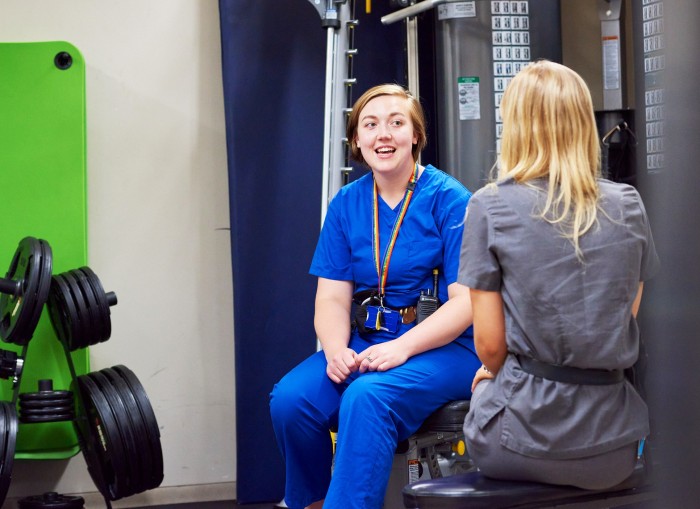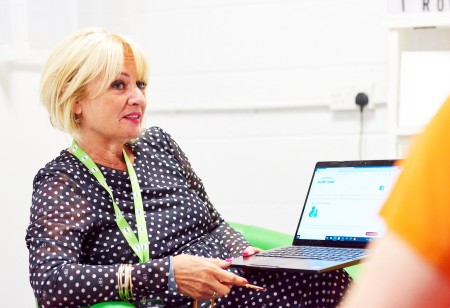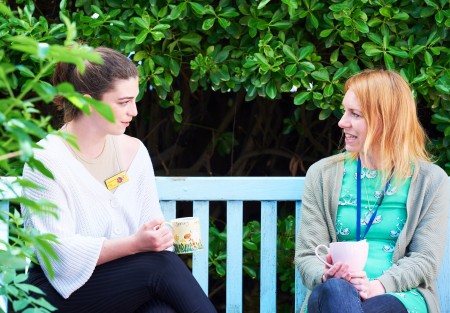Join Sussex Partnership as an allied health professional and you'll be part of a highly skilled and diverse team. You'll work with the people who use our services to maximise their abilities, enabling them to be as independent as possible and to live full, active and healthy lives.

Why join Sussex Partnership as an allied health professional
Working as an allied health professional at Sussex Partnership involves being part of an exciting team and working collaboratively with lots of different roles. It means building and using a broad range of skills, and with the opportunity to develop specialist skills too. Collaboration is key – with each other as colleagues and with the people who use our services.
See our allied health professionals in action:
What an allied health professional career has to offer
The allied health professions are a vital part of the NHS workforce. Using a variety of evidence-based skills, they work alongside other members of the team from different professional backgrounds to improve the lives of service users and carers.
They take a strength-based and recovery-focused approach to helping people, playing a key role in supporting them to live independently in the community, or to find the type of supported living that meets their needs. Helping people to improve their health and wellbeing in this way is a privilege, and the results are hugely rewarding.
Allied health professionals meet and work with a diverse range of colleagues. Working alongside each other sharing skills and best practice, helps us deliver the best outcomes for the people under the care of our services.
An allied health professional career provides opportunities to explore and specialise in a range of areas of practice. Whatever your interest or skills, you can find a career to suit you.
Read about the career pathways available to allied health professionals at Sussex Partnership.

Meet the allied health professions
There are over 450 allied health professionals at Sussex Partnership, working across seven of the 14 AHP professions.
Physiotherapists help people with a range of problems affecting movement - using exercise, massage and various other techniques.
Anyone with physical problems caused by illness, injury, disability or aging might get help from a physiotherapist.
Physiotherapists work across all six community learning disability teams in Sussex. We work very much as part of a collaborative team with a variety of other health professionals. Our role is wide and varied from falls prevention and rehabilitation to the management of long-term physical disability and health promotion.
As part of this team, you could be based in a hospital, or work out in the community, in a health centre or visiting service users’ homes.
When people with learning disabilities need the extra support of a hospital stay to help with their mental and emotional health and wellbeing, they may also need the skills of a physiotherapist to help support their mobility.
A physiotherapist will work with people whilst they stay as an inpatient to keep them steady, prevent falls and improve and increase their physical functioning and mobility.
We are currently developing a new physiotherapy service providing specialist provision around mobility and falls prevention, postural care, physical activity and health promotion in to our acute inpatient units.
An occupational therapist helps people continue their work, studies, leisure activities and everyday tasks during illnesses, injuries, disabilities or ageing.
They can help people learn to use assistive technology, help adapt their home or workplace to meet their needs, and work with people to find new ways to approach tasks.
Occupational therapists work as part of a team with a variety of other health professionals. They can also supervise junior staff or occupational therapy support workers.
Occupational therapists can help all kinds of people, from children to older people, with mental health problems, learning disabilities, and a range of other conditions. You could work with individuals and their families, and with groups of people.
They support people with a range of interventions to enable them to return to or optimise participation in all the things that people do - for example, caring for themselves and others, working, learning, playing and interacting with others. Being deprived of or having limited access to any or all of these can affect physical and psychological health, so occupational therapists have an important contribution to make to supporting people’s wellbeing and rehabilitation.
Speech and language therapists help people of all ages in Sussex Partnership. Speech and language therapists support people referred with speech, language and communication problems and people with eating, drinking and swallowing difficulties.
We have more than 30 speech and language therapists at Sussex Partnership working in our learning disability, adult mental health, dementia, forensic, gender and CAMHS services.
A dietitian helps people make informed and practical choices about food, based on the science of nutrition. As well as diagnosing and treating dietary and nutritional problems, dietitians teach people to understand food, promote good health and prevent disease.
Dieticians at Sussex Partnership can help people with a range of issues such as those wanting to lose or gain weight, or those with eating disorders, digestive problems or allergies.
Dieticians are the only qualified health professionals who assess, diagnose and treat diet and nutritional problems at an individual and wider public health level.
Dieticians use the most up–to-date public health and scientific research on food, health and disease, which they translate into practical guidance to enable people to make appropriate lifestyle and food choices. Dietitians are the only nutrition professionals to be regulated by law, and are governed by an ethical code to ensure that they always work to the highest standard.
Art therapists use art as a form of psychotherapy to encourage clients to explore a variety of issues including emotional, behavioural or mental health problems, learning or physical disabilities, life-limiting conditions, neurological conditions or physical illnesses.
People of all ages from children to the elderly, regardless of artistic experience, can use art therapy in this way as an aid to support them with their particular concern. It is not a diagnostic tool but rather a mode of communication and expression.
Drama therapists are both clinicians and artists that draw on their knowledge of theatre/drama and therapy to use performance arts as a medium for psychological therapy. Clients are able to explore a wide variety of different issues and needs from autism and dementia to physical/sexual abuse and mental illness in an indirect way leading to psychological, emotional and social changes.
Music therapists engage people in live musical interaction to promote an individual’s emotional wellbeing and improve their communication skills. The people they work with do not need to have any previous experience of playing a musical instrument (or even singing) as this established psychological clinical intervention utilises their unique connection to music and the relationship established with their therapist to help:
- Develop and facilitate communication skills
- Improve self-confidence and independence
- Enhance self-awareness and awareness of others, and
- Improve concentration and attention skills.
Working at Sussex Partnership
Join Sussex Partnership and you'll be part of an NHS trust that allows you to thrive and, in turn, thrives because of you. We believe in the vibrancy of our fantastic people. And how that leads to even better support for the people who use our services.
Professional development
We're passionate about investing in our people to enable them develop and grow professionally. Join our team of allied health professionals and we will support you in your career progression and development, with a variety of training and development routes and opportunities.

Staff wellbeing
We know that supporting people with mental health problems and learning disabilities can be demanding so we offer our staff a range of wellbeing incentives, including mindfulness sessions, free access to apps such as Headspace and discounted gym membership. Find out more about the employee benefits we offer. Read more about our rewards and benefits.
And we encourage our staff to achieve a positive work/life balance by offering flexible working. We know this has huge health-related benefits for our staff, which in turn has a positive impact on the care we provide. Read more about flexible working.